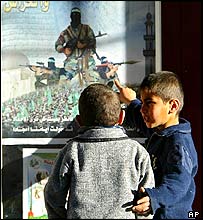
The election result cements Hamas's hold over Gaza
|
Palestinian militant group Hamas has won a huge victory in local polls in Gaza, final results show.
Seen in Israel as a terrorist group, Hamas appears to have won roughly two-thirds of the seats it contested.
Israel has meanwhile said it is ending "offensive operations" in parts of Gaza where Palestinian police are deployed.
Palestinian security forces are taking over in Gaza to curb militant attacks on Israel, as part of a series of moves to rekindle a peace process.
The police took up positions in central and southern Gaza, having already taken charge of the northern part of the territory last week.
Palestinian leader Mahmoud Abbas, elected in early January, has been calling upon Israel to respond to his efforts at reining in the militants.
He has so far secured a temporary, unofficial truce from the militant groups, with the promise of a more stable ceasefire if Israel agrees to end military operations in Gaza and the West Bank.
Following the arrival of thousands of Palestinian policemen in Gaza, the Israeli army's chief of staff, Moshe Yaalon said on Friday that offensive operations would cease where "there is calm and where there is no terrorist activity against Israeli civilians and soldiers".
Street credentials
In elections held in 10 districts of Gaza this week, Hamas won at least 75 seats out of 118 seats.

Hamas's social welfare programme has won it broad support
|
The ruling Fatah faction of Palestinian leader Mahmoud Abbas won at least 26 seats.
While Hamas's international image has been fashioned by violence, its support in Gaza also stems from an extensive social welfare programme and a reputation for probity.
The BBC's Alan Johnston, in Gaza, says the results have to be kept in context - these were only local elections, for less than half of the councils in Gaza.
Nonetheless, he says, they give a clear indication of the real power of Hamas in the streets.
Gaza's large population centres of Khan Younis, Rafah and Gaza City did not vote this time.
A Palestinian electoral official said they would cast their ballots on 28 April.
'Rejection of corruption'
The elections - including recent votes in the West Bank - marked the first time Hamas fielded candidates in Palestinian elections.
Although the elections were for local councils only, correspondents say the results will be a blow to Fatah, and a step forward for Hamas.
Hamas spokesman Mushir al-Masri told the AFP news agency the results were a victory for democracy and showed that the "Palestinian people reject corruption".
Hamas militants are behind most of the suicide bombings inside Israel, and the attacks on Israeli forces and settlers in the occupied territories.
Israeli Prime Minister Ariel Sharon praised Mr Abbas on Thursday, describing conditions as ripe for "a historic breakthrough" in relations with the Palestinians.
Mr Abbas has ruled out an armed crackdown on the militants in favour of negotiations.
Other measures include a ban on civilians bearing weapons in public.
The new US Secretary of State Condoleezza Rice is set to visit the region shortly to assess the peace process.